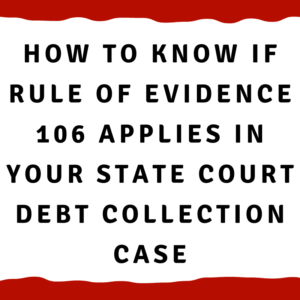How to know if Rule of Evidence 106 applies in your state court debt collection case
How to know if Rule of Evidence 106 applies in your state court debt collection case
Recently, we made a post discussing Rule of Evidence 106, also known as the Completeness Doctrine. Since making this post, we have received quite a few questions.
This rule says that if you introduce part of a document then you are in fairness required to submit the entire document if requested.
One of our Youtube viewers commented:
“I quoted this rule to the plaintiff’s lawyer (the collection lawyer) and she said that this federal rule of evidence doesn’t apply in the rule of evidence. Our trial is in district court and is governed by state and civil procedure rules of evidence.”
I believe in this situation the collection lawyer was being somewhat accurate but also a little misleading.
If you are sued in state court, it is true that the federal rules of evidence do not apply.
But you know what does apply? The state rules of evidence.
In our posts, we specifically look at Alabama Rules of Evidence since this is where we practice.
Make sure to check your specific state rules. Generally, they are listed by the same numbers.
In the big picture view, federal rules do not apply in state court. Instead, state rules of evidence and state rules of civil procedure apply.
We have to look at what court we are in.
Let’s say we are in Arizona small claims court.
I have a friend who practices there, John Skiba (A.K.A. Consumer Warrior John Skiba on Youtube).
If he shows up to court in Arizona and starts trying to argue based on Alabama rules of civil procedure, this will not work.
The judge would say, “What are you doing? We are not in Alabama. This is Arizona.”
So, he must argue under Arizona rules.
If you are in federal court you argue under the federal rules. If you are in state court, you argue under state rules.
In these posts, I pick Alabama rules of evidence to show what we do here. You will want to check your specific state.
Even in Alabama, if we are in small claims court, the rules are kind of relaxed; judges can choose to apply them or not apply them.
If we are in district court or circuit court in Alabama, there is no choice. The rules of evidence must be applied.
Why are most states similar?
In Federal Court, we have the Federal Rules of Civil Procedure.
These rules govern how things are done.
For example, Rule 8 is how to draft a complaint, Rule 12 is how to do a motion to dismiss, and Rule 56 is how to do a summary judgment motion.
These rules apply to all district federal courts.
State or tax courts have similar rules, but they are not identical.
Most, but not all states, follow the same numbering system used in the federal rules.
So, there is the Alabama Rule of Civil Procedure 8 that tells you how to write a lawsuit, Alabama Rule of Civil Procedure 12 is about how to file a motion to dismiss, and Alabama Rule 56 discusses summary judgments.
This same thing happens with the rules of evidence.
The Federal Rules of Evidence are numbered and Alabama rules follow the same numbers.
Although the rules are not exactly the same, the numbering is similar.
Most states have this law, as we do in Alabama, that says if there is a similar or identical federal rule, then what federal judges have said will help to interpret that rule.
So how can you know whether Rule of Evidence 106 applies in your case?
If you can, go watch the judge in person.
You have to know your particular court and judge.
At the time this is being posted, Fall of 2020, we are still in the middle of the pandemic.
This may make it difficult for you to go in person to watch your particular judge.
But if at all possible, do it.
Look up the rules for your court and state.
Do a Google search for “[Your state] Rules of Evidence”.
You could specify Rule 106 or the Completeness Doctrine in your search.
Google Scholar is free to use and is helpful for looking at these rules in detail.
Select case law and then select your court. From there, you can put in your search terms.
Read what your state’s rules of evidence have to say.
For the rules of evidence, a simple Google search should suffice.
Make sure you are using your rule for your state and that is appropriate for your court.
Knowing your state and court specific rules will help you tremendously during your lawsuit.
We hope this is helpful to you!
Thanks for reading this and consider subscribing to our YouTube channel.
If you live in Alabama and you have any questions, feel free to get in touch with us.
We would be glad to help you in any way we can.
You can reach us by phone at 1-205-879-2447, or you can fill out a contact form and we will get in touch with you quickly.
Have a great day!
